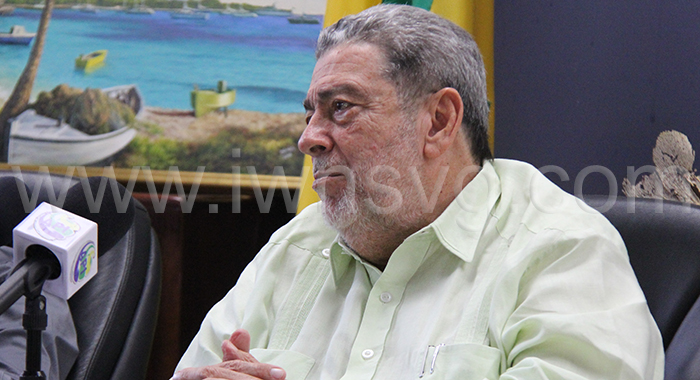Exports from St. Vincent and the Grenadines to the United States have averaged about one-third of 1% of GDP over the last decade.
Therefore, the 10% tariff that the Donald Trump administration imposed on exports from Kingstown is not expected to have as much impact as imports from the United States, Prime Minister Ralph Gonsalves has told Parliament.
“Exports, for instance, increased steadily from about $2 million in 2015 to $18.4 million in 2022 and then falling off to almost $11 million in 2023 and about half of that in 2024,” Gonsalves said.
“The declines in 2023 and 2024 are principally due to a reduction in the export of conch, lobster and some other seafood, according to the stats,” he further stated as he responded to a question from opposition lawmaker, East Kingstown MP Fitz Bramble.
“So that purely, if you look only at the 10% tariff on such a small value of goods, you’re not going to find it having a direct impact across the economy, but it may well have in relation to the particular items which you’re exporting, and the particular exporters may have a challenge; maybe, maybe not, depending on the type of commodity.”
Bramble, an economist and former diplomat, had noted that Trump had announced the imposition of a baseline 10% tariff on goods entering the United States from all countries.
He asked Gonsalves to state his government’s response to the tariff policy; indicate how this policy will affect Vincentians, and say what the government plans to do to cushion the impact of the tariff on SVG.
The prime minister said that while Bramble had asked about the 10% tariff on imports from SVG, the data about what Kingstown imports from the United States were important.
“That is where the issue comes in big,” Gonsalves said, adding that in 2024, SVG imported US$135 million worth of goods.
Gonsalves told lawmakers that he had commented on radio that it was “almost obscene for the richest, most-powerful country in the world to say that they are disadvantaged and that they must be made advantaged by putting on tariffs on countries more than hitherto”.
He said people “who instinctively jumped would jump to the defence of the United States.
“I jump to the defence of the United States on certain matters, on others I’m critical because we have to keep an independent position and a balanced position and a truthful position, and look at our own interests.”
He said the problem for SVG created by the tariffs would be the increase in prices of commodities, which, whether they originate in or pass through the US, have to pay “these excessive tariffs”.
Gonsalves noted that Washington has put a pause on the tariffs.
“What would have really hit us right away is if they had carried out, if they didn’t exempt Tropical and the lines from the million US, every time a Chinese-made vessel enter the port,” Gonsalves said, noting that more than half of the vessels that Tropical bought many years ago were made in China.
He said that if such a vessel docks in St. Thomas after leaving Miami, another US$1 million would be levied on it.
“And those vessels are relatively small vessels, and the value of the goods which would be held there to accommodate that increase would have made things really, really difficult for us.
“It’s going to be challenging if there is not a resolution as to the goods which passing through, the United States Trade Representatives have already said, ‘Don’t ask us about exempting anything transit. Once it lands in America, the tariff had to be paid’,” the prime minister said.
He said it would take time and resources to do an alternative transit point.
Gonsalves said another impact is that almost all the reputable economists and the major agencies say that the tariffs are likely to bring about stagnation or recession internally in the United States, accompanied by an increase in the price of goods.
“That happens, that could have a knock-on effect on us, for instance, with tourists. Because if you have less money to spend, we’d have to look for markets elsewhere.”
He said SVG was already looking for other source markets for tourists, adding that hotels such as Sandals and those in the Grenadines were looking for other markets.
“The people who operate the hotels in St Vincent and the Grenadines they’re importing stuff coming through Miami. The price might go up, depending on the extent of the increase, after they have this pause and negotiation. We don’t really know the final — we are in a state of transition, in a state of flux, but we have to be analysing it all the time.”
Gonsalves, however, noted that the Eastern Caribbean dollar is pegged to the United States dollar, adding that if the value of the US dollar falls, there would not be a currency challenge for the Eastern Caribbean Currency Union.
“It’s the same dollar, the same 2.70 we’re paying,” Gonsalves said, referring to the US-Eastern Caribbean dollar exchange rate.
“But, in relation to third countries, our product, theoretically, could be cheaper for them — who want to buy our commodities — but what we’re buying from them is going to be more expensive because the currency could create a problem. That’s an additional problem.”







What products is Gonsalves talking about? The people who operate hotels in SVG is mostly the government. Gonsalves is not fully awake so he thinks we are not either. When Gonsalves is competing for relevance, he will peddle the weirdest nonsense and give the biggest handouts to appease the unwitting but not this time, it won’t work.
😂, modooo. ah wish mirrors could ah talkkk.